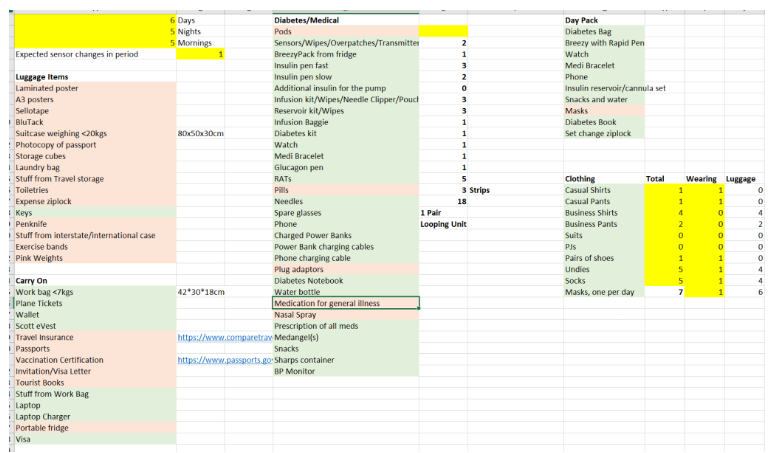Can ChatGPT Replace Diabetes Educators? Perhaps Not Yet by Liam Davenport for MedScape.com, 14 April 2023.
 ChatGPT, the novel artificial intelligence (AI) tool that has attracted interest and controversy in seemingly equal measure, can provide clear and accurate responses to some common questions about diabetes care, say researchers from Singapore. But they also have some reservations. Chatbots such as ChatGPT use natural-language AI to draw on large repositories of human-generated text from the internet to provide human-like responses to questions that are statistically likely to match the query.
ChatGPT, the novel artificial intelligence (AI) tool that has attracted interest and controversy in seemingly equal measure, can provide clear and accurate responses to some common questions about diabetes care, say researchers from Singapore. But they also have some reservations. Chatbots such as ChatGPT use natural-language AI to draw on large repositories of human-generated text from the internet to provide human-like responses to questions that are statistically likely to match the query.
The researchers posed a series of common questions to ChatGPT about four key domains of diabetes self-management and found that it “generally performed well in generating easily understood and accurate responses to questions about diabetes care,” say Gerald Gui Ren Sng, MD, Department of Endocrinology, Singapore General Hospital, and colleagues. Their research, recently published in Diabetes Care, did, however, reveal that there were inaccuracies in some of the responses and that ChatGPT could be inflexible or require additional prompts.
-
-
- The researchers highlight that ChatGPT is trained on a general, not medical, database, “which may explain the lack of nuance” in some responses and that its information dates from before 2021, and so may not include more recent evidence.
- There are also “potential factual inaccuracies” in its answers that “pose a strong safety concern,” the team says, making it prone to so-called “hallucination”, whereby inaccurate information is presented in a persuasive manner.
- Sng said that ChatGPT was “not designed to deliver objective and accurate information” and is not an “AI fact checker but a conversational agent first and foremost.”
-
Read more:
South Korean manufacturer spells out $100M plans for West Virginia insulin production facility by Tyler Patchen for Endpoints.com, 13 April 2023.
 A South Korean-based manufacturer of insulin is planting its flag among the mountains of West Virginia. Gov. Jim Justice announced that UNDBIO has inked a lease with the University of West Virginia to build an insulin manufacturing facility in the city of Morgantown, WV. UNDBIO, a producer of insulin and insulin analogs, glucose monitoring systems and monoclonal antibodies, plans to invest $100 million in the project, which should create around 200 jobs in the first three years.
A South Korean-based manufacturer of insulin is planting its flag among the mountains of West Virginia. Gov. Jim Justice announced that UNDBIO has inked a lease with the University of West Virginia to build an insulin manufacturing facility in the city of Morgantown, WV. UNDBIO, a producer of insulin and insulin analogs, glucose monitoring systems and monoclonal antibodies, plans to invest $100 million in the project, which should create around 200 jobs in the first three years.
According to Gov. Justice:
-
-
- In the first phase, UNDBIO plans to secure FDA approval of its insulin product, with plans for expansion after a potential approval, Justice said in an announcement on Wednesday.
- The state offered the manufacturer a financial incentive package to “help seal this deal” but did not give a hard figure. The project is expected to break ground sometime in September or October of this year, secretary of the West Virginia Department of Commerce Mitch Carmichael said in the announcement.
- “The addition of these good paying jobs with the potential for even more in the future is surely great, great news for Morgantown.”
-
UNDBIO launched in 2010 as UNDPHARM, according to its website. The manufacturer opened a 25,000-square-foot R&D and lab facility in Rockville, MD, last year. UNDBIO CEO Jun Yong Soo said in the announcement that he plans to bring “price competitive” insulin to the US market and wants to make Morgantown the “Mecca” for the production of its insulin.
Read more: South Korean manufacturer spells out $100M plans for West Virginia insulin production facility
Walking 8,000 steps just 1-2 days a week linked to significant health benefits by Robby Berman for MedicalNewsToday.com, 2 April 2023.
 Briskly walking 8,000 or more steps each day of the week is associated with a significant decrease in all-cause and cardiovascular mortality. A new study finds, however, that people taking just 8,000 steps one or two days a week are also less likely to die over a 10-year follow-up period.
Briskly walking 8,000 or more steps each day of the week is associated with a significant decrease in all-cause and cardiovascular mortality. A new study finds, however, that people taking just 8,000 steps one or two days a week are also less likely to die over a 10-year follow-up period.
The study published in JAMA Network Open found that over a decade of follow-up, people 20 years or older who took 8,000 or more steps on one or two days a week were 14.9% less likely to die compared to people who were sedentary.
The risk of death dropped as the number of days involved increased. For example, exercising from three to seven days a week was associated with a 16.5% reduction in all-cause and cardiovascular deaths. The same pattern held true for people meeting step goals of 6,000 to 10,000 steps. Previous research found that mortality risk decreases up to 10,000 steps per day for people younger than 60 and 8,000 for people older than 60.
The study’s findings pertain to both “weekend warriors,” people who confine their exercise to non-work days, and to people who steal a few hours to walk during the week. The study cites recent data showing the average American takes just 4,800 steps a day, too few to provide much of a health benefit. “Brisk walking” is defined as walking three miles an hour. If you can speak song lyrics but not sing them, you are walking briskly.
Read more: Walking 8,000 steps just 1-2 days a week linked to significant health benefits
A daily dose of blueberries could improve cognitive and cardiovascular health by Robby Berman for MedicalNewsToday.com, 12 April 2023.
 A cup of wild blueberries is more than a tasty snack, according to a new study from King’s College London Faculty of Life Sciences and Medicine in the United Kingdom. It can also provide a brain boost, lower blood pressure, and contribute to better cardiovascular health. The randomized, double-blind, placebo-controlled trial found that blueberry eaters exhibited improved executive function, strengthened short-term memory, and had faster reaction times.
A cup of wild blueberries is more than a tasty snack, according to a new study from King’s College London Faculty of Life Sciences and Medicine in the United Kingdom. It can also provide a brain boost, lower blood pressure, and contribute to better cardiovascular health. The randomized, double-blind, placebo-controlled trial found that blueberry eaters exhibited improved executive function, strengthened short-term memory, and had faster reaction times.
Participants who consumed blueberries were better at immediately recalling word lists and exhibited improved switching accuracy. The study appears in the American Journal of Clinical Nutrition
The researchers believe the blueberries’ beneficial effects are due to their blue pigments called anthocyanins. Each daily dose of wild blueberry powder in the study contained 302 milligrams (mg) of anthocyanins. The placebo beverage contained none. “Anthocyanins are a class of polyphenols,” explained Michelle Routhenstein, a heart health dietitian not involved in this study. “[T]here are about 8,000 different types of polyphenols that provide health benefits,” she added. “Some other types of foods that have beneficial polyphenols include green tea, broccoli, pears, and spices like turmeric and cinnamon.” Anthocyanins are also present in strawberries, raspberries, red grapes, and purple vegetables.
The mechanism behind the beneficial effects of polyphenols is not yet fully understood. One theory is that polyphenol “metabolites may act as signaling molecules, acting through several cell-signaling pathways, modulating nitric oxide bioavailability and different enzymes,” said Dr. Ana Rodriguez-Mateos, senior investigator.
Read more: A daily dose of blueberries could improve cognitive and cardiovascular health
What To Pack When Travelling (Day Pack) by Leon Tribe for PracticalDiabetic.com, 15 April 2023.
We are coming into travel season … let’s get prepared, with the help of Leon Tribe and traveling as a pumping and CGMing type 1 – Part One (Day Pack). His advice includes:
-
- My Diabetes Bag
- FlexPen (s)
- Diabetes-Compatible Watch
- Medi/Emergency Bracelet
- Mobile Phone
- Pump Consumables
- Snacks and water
- Masks
I’ve also suggested a PMR – Personal Medical Record as a notebook or on a flash drive, with includes your medical history and diabetes management info, contact lists (friends, family, HCPs), your pump settings, possibly a copy of your last labs, etc. Here’s the link to my page for preparedness. It also includes a spreadsheet for packing a Go Bag. TheSavvyDiabetic The Prepared T1D
This is such a great plan, to stay healthy and prepared when you are away from home. Please do set aside time to compile your Go Bag and medical info. You just NEVER know when you might need it!
Read more: What To Pack When Travelling (Day Pack)
When in the hospital, who calls the shots? posted by Terry O’Rourke for TuDiabetes.org, 10 April 2023.
Taking Control of Your Diabetes or TCOYD just posted a podcast that discusses the topic of managing your diabetes in a hospital setting. Dr. Jeremy Pettus interviews Dr. Tricia Santos about this topic. She works as part of an in-patient expert team that actively manages blood glucose treatment of patients who end up in the hospital. The podcast emphasizes some very important points. Chief among these is the importance of being honest with the hospital staff about your specific diabetes management.
A dream situation for me is a well-informed about all-things-diabetes staff where the responsibility is shared, when appropriate, and dosing decisions are made collaboratively. My last hospital experience included me aggressively maintaining insulin dosing management while I wished that the responsibility could have been shared. Dr. Santos seems ideally informed to help manage diabetes in her hospital but I don’t think her level of diabetes management is representative, at all, in the hospitals that we typically experience.
Do you trust your local hospital to call the shots correctly?
Read more: When in the hospital, who calls the shots?



Nope, I do not put my faith in a hospital or its staff. Or more in particular the Hospitalist who works there and two times withheld insulin, because you know people with T1, they don’t need insulin. I’m sure it is awesome to be cured of diabetes even if your blood sugar is over 400 and no one will do a damn thing about it.